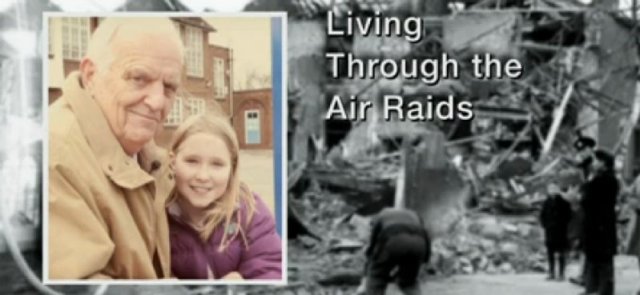Broadcaster: BBC 2
Year: 2013
Genre: Documentary
URL: http://bobnational.net/record/175210
Review by: Georgina Lockton
Children of World War II is a thirty minute programme in which three people who were children in Britain during the Second World War talk about their memories to a young relative or friend. The programme is split into three sections made up of what are essentially three video-recorded oral history interviews conducted by the young persons with their subjects. As part of the interview, the subjects take the young interviewers around sites and locations which they remember from the war, bringing their stories to life for the viewer.
The programme is clearly pitched at a young audience, perhaps a Key Stage 2 class which is looking at the Second World War. This is evident in the use of young interviewees, who appear to be of Key Stage 2 age themselves, as well as in the everyday language that is used throughout the programme. However, do not let this put you off viewing this programme as an academic! What you have here are three video-recorded oral history testimonies of memories from the War which are no less useful to the historian interested in the lived experiences of everyday life than the oral history records that sit in the trusted archives. I will look at each of the three interviews contained within the programme and provide an analysis of each. This will facilitate an informed decision as to the usefulness, or otherwise, of this programme to the historian.
The first interview is conducted by Isabel with her grandfather Alan. It incorporates a visit to Alan’s old school in Wembley and he talks about his memories of being at school during the war. Visiting his old house, Alan demonstrates safety precautions which his family took to stay safe during air-raids, including sleeping under the dining room table and under an ironing board over the bed. He tells how the house next door was bombed and his house was damaged, and recalls how he was carried out of the house but that his mother was killed in the blast. The deeply sad, harsh reality of war is conveyed in this first hand recollection of the War. This is an element that can easily be lost in textbooks and demonstrates the significance of using oral history to bring a sense of reality to the topic one is researching.
Interview number two is conducted by Anesha with a family friend, Mrs Campbell, in Cardiff. Mrs Campbell tells of her recollections of being evacuated at the age of seven to Aberdare on the train. She describes her experiences as an evacuee and how it felt to be sent away from home to live with an unknown family. She recalls that her father was in the Merchant Navy and that they received news in 1942 that his ship had been torpedoed, showing again the deep sadness and reality of war. Mrs Campbell conveys to the viewer through her first-hand account what it actually felt like to be an evacuee, and again the visually recorded oral account she provides serves to bring a sense of reality to the plain facts that students of history read about in textbooks.
The third interview is conducted by Tyler with family friend Sarah. Sarah recalls her father joining up to go to war and her mother going out to work, commenting on how the War brought changes to the family structure as prior to war her mother hadn’t worked. She speaks of helping at home, of rations, and of leaving school at the age of fourteen to start work on a local farm. She also recalls her father returning from the War and all the neighbours holding a street party for him. Again, this interview brings Sarah’s memories to life as she takes the viewer to various locations she speaks of, giving a human side to what would otherwise be a black and white account of living through the War.
In summary this programme is easy to view and is suitable for all ages, making it a good resource for primary school teachers who are teaching the topic of the Second World War. But how useful is it in academic research? As a social historian I enjoyed listening to the first-hand accounts of the interviewees in this programme as they recalled their memories of the War. It brought the subject to life and injected reality to the black and white textbooks I have studied so far. Oral history accounts such as these can form the basis of, or augment, a research project and their value should not be overlooked. History does not start and finish in the archive. For people who remember historical events, such as the Second World War, history is very much alive in their living memories and oral records are a source of information that must not be overlooked. Even if the interviews in this particular programme are not relevant to your research area I hope that it inspires you to consider collecting your own oral history interviews (this programme demonstrates that even children can do it!) to capture important social evidence that is still in people’s living memories, before it is too late.

